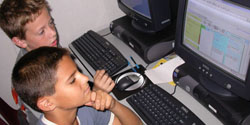

Higher Order Thinking Skills
Teaching and Learning Strategies
Higher Order Thinking
Learn about approaches to higher order thinking skills. Analysis Using Knowledge Metacognition Thinking with Data |
Deep and Meaningful Thinking
With the widespread use of computers in the 21st Century, human beings can use ICT to go beyond the kind of rationality that is best performed by machines to the kind of thinking that is inventive, productive, and ethical.
Most educators would agree that their learners are not as proficient at these kinds of thinking as they would like them to be. Textbooks and other teaching materials often consist of activities that require low-level skills such as recall and memorization. The academic standards movement of the last decade has focused interest on the development of higher-order thinking skills through more rigorous academic expectations. These kinds of skills can be grouped into three categories.
Analysis >
Analysis, as defined by Robert Marzano, consists of matching, classifying, error analysis, generalizing, and specifying. By engaging in these processes, learners can use what they are learning to create new insights and invent ways of using what they have learned in new situations. When people use analysis skills to determine the validity and worth of a particular piece of information, they are engaging in critical thinking. Another type of analysis is argumentation, the presenting of claims and evidence persuading others of a point of view.
Using Knowledge >
The purpose of having knowledge is to use it. Conventional educational practices assumed that learners needed a considerable amount of knowledge in order to do anything with it. Unfortunately, learners rarely moved past the learning of facts, accumulating more and more of what philosopher Alfred Lord Whitehead called “inert knowledge.”
Using knowledge is the fun, and frustrating, part of learning. Project-based learning allows learners to practice higher-order thinking and use knowledge. The processes included in this category are decision making, problem solving,experimental inquiry, and investigation. Creativity, another type of complex thinking, is often described as a special type of problem solving.
Metacognition >
Metacognition, or “thinking about thinking” refers to the mental processes that control and regulate how people think. Metacognition is especially important in project-based learning because learners must make decisions about what strategies to use and how to use them. The three components of metacognition are: awareness, planning and goal setting, and monitoring. Learners who are metacognitively aware are able to describe how they make decisions and are able to adjust the strategies they use when they are not successful.
Thinking with Data >
In the 21st Century, using data involves more than adding numbers and performing statistical analyses. It requires logical thinking, creativity, collaboration, and communication. Learners must learn to think with all kinds of data responsibly in order to make good decisions in their personal lives and to participate fully in debates about the political, social, and environmental issues of contemporary life.
References
Marzano, R. J. (2000). Designing a new taxonomy of educational objectives. Thousand Oaks, CA: Corwin Press.
Marzano, R. J. (1998). A theory-based meta-analysis of research on instruction. Aurora, CO: McREL, 1998. www.mcrel.org/PDF/Instruction/5982RR_InstructionMeta_Analysis.pdf *(PDF; 172 pages)
